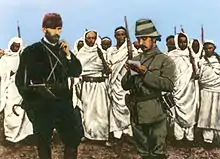| Battle of Tobruk | |||||||
|---|---|---|---|---|---|---|---|
| Part of the Italo-Turkish War | |||||||
 Young officer Mustafa Kemal dictating a letter | |||||||
| |||||||
| Belligerents | |||||||
|
|
| ||||||
| Commanders and leaders | |||||||
|
|
| ||||||
| Strength | |||||||
|
|
| ||||||
The Battle of Tobruk (1911) or Nadura Hill Battle occurred on 22 December 1911 during the Italo-Turkish War. The battle was a small engagement primarily known for the involvement and leadership of future Turkish president Mustafa Kemal Atatürk.
Background
The First Fleet of the Italian naval forces, commanded by Vice-admiral Augusto Aubry, approached Tobruk on 3 October and invaded the city the next day without encountering any serious opposition. The Ottoman forces were organized by Enver Bey (later Enver Pasha) after trivial clashes on 9 November. The leader of the Tripolitanian Bedouin force was Sheik Muberra (Al Mabri Yaseen), who was backed by his "Meryem" clan and other Senussi volunteers.
Battle
In the first week of December 1911 Italian soldiers captured the Nadura Hill in Mureyra Valley and were busy digging trenches and preparing fortifications while they waited for reinforcements.
Captain Mustafa Kemal was in command of Tobruk region and foresaw that the consolidation of Italian forces would jeopardize his position. As such, Kemal ordered Sheik Muberra to attack as soon as possible to prevent the reinforcement of the Italians on Nadura Hill. At the same time, Turkish soldiers and Tripolitanian volunteers under the command of Enver Pasha were ordered to attack the Italians on Nadura Hill. Enver Pasha's force approached Nadura Hill just before dawn and attacked. The Italians were surprised and responded in a disorganized fashion without the benefit of cannon fire. Nadura Hill was captured in two hours and the Italian Bersaglieri retreated to Tobruk while leaving three machine guns along with munitions.
Meanwhile, Sheik Muberra and his force, consisting of a thousand soldiers, attacked the Italian reinforcements who were to support the Italians on Nadura Hill. Sheik Muberra, however, was shot and killed along with ten Tripolitanian volunteers. After five hours of fighting, the Italians were forced to retreat to Tobruk.
Aftermath
This battle was a secondary but important step in hindering the Italian advance into the interior at Tobruk in December 1911. The Italians later reinforced all of their beachhead enclaves in Tripolitania in January 1912 and continued their occupation of Tobruk until the war ended in October 1912.[3]
See also
Citations
References
- Erikan, Celal (2001). Komutan Atatürk [Commander Ataturk] (in Turkish). Türkiye İş Bankası Cultural Publications. ISBN 975-458-288-2.
- Reports of the Italian General Staff (1914). The Italo-Turkish War (1911-12) (in Italian). Translated by First Lieutenant Renato Tittoni, U.S.M.C. Kansas City: Franklin Hudson Publishing Company.
- Turkish Armed Forces-Division of History and Strategical Studies, ed. (1985). 1911-1912 Turco-Italian War and Captain Mustafa Kemal. Ankara: Ministry of Culture of Turkey.